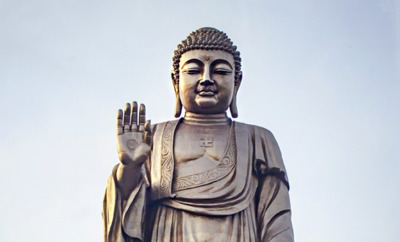Okay Buddha, Let’s Talk About the Third Noble Truth and What Brings an End to Our Suffering

The Four Noble Truths in Buddhism all relate to suffering. The First Noble Truth states that suffering exists; the Second Noble Truth looks at the cause of suffering; the Third Noble Truth states that an end to suffering is possible; and the Fourth Noble Truth gives a path to that end.
The First Noble Truth is easy to understand and certainly hard to argue with – suffering exists in many places and in many forms.
The Second Noble Truth is a slightly bigger concept to grasp, stating that ultimately, it is our attachment to our desires that causes us to suffer.
Okay Buddha, Let’s Talk About the Second Noble Truth and the Causes of Suffering
We cling to what we want and alternatively push away what we don’t, trying to mold life into how we think it should look. When reality catches up and is at odds with our desires, we suffer.
Let’s look closer at the Third Noble Truth and what an end to suffering really means.
So – How Do We End Suffering?
The answer is often referred to as Nirvana or Enlightenment. In the simplest of terms, it is a permanent state of mind that is free from negativity and full of joy and compassion.
According to Buddhism, we reach this state by freeing ourselves from the cause of suffering, which is – you guessed it – desire. We need to release our attachment to our desires.
We cling to what we want and alternatively push away what we don’t, trying to mold life into how we think it should look.
Now, it is important to point out that our desires are not always pleasant. We have this thing called an ego and while it pretends like it is looking out for us, it is often the root of our limiting beliefs, self-destructive patterns, and negative self-talk.
Therefore, oftentimes our desires subconsciously take the form of furthering the negative story our ego is telling us:
We aren’t smart enough.
We don’t deserve to be happy.
Nobody respects us.
These beliefs become our comfort zone and whether we are aware of it or not, our desire is to keep living in this familiar and presumably ‘safe’ story.
These 4 Simple Words Will Banish Your Negative Self-Talk FOREVER
Basically, we hold on so tightly to what we think life should look like that we refuse to accept reality when it arrives in a different form, for better or worse.
We need to release our attachment to our desires.
That is the suffering: believing things should be different, wanting others to be different, and wishing we were different vs. simply accepting things as they are.
Buddhism teaches us to release our desire for what we want life to look like so we can see it and accept it for what it is.
The Third Noble Truth: Accepting Our Reality As It Is
Accepting our reality as it is can be a tricky thing to understand – are we supposed to not want anything? Are we supposed to stop caring about what happens in our lives? Should we not set goals or have dreams?
Not at all. Not caring about anything is simply the pendulum swinging the other way – pushing instead of pulling. The Third Noble Truth shows us that it isn’t about not caring from a place of apathy, but about allowing from a place of acceptance.
How do we do this? There are two steps to accepting our reality as it is.
First, stop arguing with it.
Now, you may think you don’t argue with reality, but chances are high that you do. How many times have you started a sentence with, “I can’t believe she…” or, “He shouldn’t have…” or even, “I don’t understand why they…”
Any time you’ve thought that things should be different, wished someone was different, or had any negative reaction to anything that has already happened . . . that’s arguing with reality – not accepting it. And this is how we suffer.
We hold on so tightly to what we think life should look like that we refuse to accept reality when it arrives in a different form, for better or worse.
We can put a stop to the fight by approaching life with compassion and understanding. Compassion does not mean feeling sorry for someone. Compassion means seeing and recognizing their suffering.
5 Unusual Things That Happen When You Go Through a Spiritual Awakening
If we can shift the lens from how others have wronged or hurt us to how they are hurting, we can move from arguing to understanding.
Buddhism teaches us to release our desire for what we want life to look like so we can see it and accept it for what it is.
Because when we see where someone is coming from – why and how they are suffering – we can then understand why reality showed up as it did. We must understand it to accept it.
Second, see reality for what it is and only what it is.
In Buddhism, there is a concept of disenchantment, which essentially means seeing things for what they are instead of being misled or enchanted by them.
What does that mean, exactly? It is referring to all the assumptions we make once reality arrives. It’s all the meaning we place on things.
Your significant other forgets your anniversary and you question their love or commitment to your relationship.
Your boss is late to a meeting with you so he/she must not respect your time.
Someone cuts you off in traffic so they must think they’re more important than you.
This is simply another form of attachment and another way we stay within our stories. We assign meaning, conclusions, and predictions about the future to almost everything we encounter in the present.
And we suffer for it. We suffer because we are being misled in a negative direction or because we allow it to give way to a new desire for us to attach to.
Your crush waves at you across the room and you take it as proof of an impending relationship.
Your boss applauds your report so you must be getting the promotion.
Your daughter had a great first date and you start daydreaming about planning her wedding.
Reality then catches up to those desires and when it doesn’t match, we wish it were different and again we suffer. The cycle goes on and on.
Buddhism and Our Take On Life
Spiritual teacher Byron Katie said it best: “We don’t hear what someone said; we imagine what they meant.” We do this all the time.
We are constantly analyzing situations and people and attaching meaning to them. But when we do that, we are only seeing things from our perspective – a perspective that is skewed from our past experiences and habitual thought patterns; a perspective that has been crafted to stay in line with how we think life should be – in line with our stories.
Practicing compassion and understanding helps us recognize that another perspective exists, therefore fostering connection and loosening our grip on how we see the world.
Buddhism teaches us to bear witness to life instead of constantly analyzing and judging it. Think about it – there are countless perceptions of any one situation. Some may align but most will differ if even in the slightest sense.
What Is Dharma and How Can It End Your Suffering?
If perception is reality, and there are countless perceptions, then what is real? What is the truth?
The only reality is that something/someone exists; that something happened. And the only truth is that you are aware of it – that you are witnessing it. Anything beyond that involves individual analysis and subjective attachment of meaning.
Third Noble Truth: To End Our Suffering, We Must Open Our Minds
When we use the Third Noble Truth and recognize this, our minds and our hearts can become more open and receptive. We are no longer stuck on – or attached to – what things mean and how we think life ‘should’ be. We are free to break out of our stories and live in harmony with life instead of at odds with it.
Samadhi Explained: The Eighth Limb of the Yoga Sutras and the Gateway to Enlightenment
It is only when we release our attachments and let go of our desires that we become open. And when we are open, there is no more friction with reality. There is only acceptance.
So, as life continues to unfold in front of you, try applying the Third Noble Truth and instead of trying to control it and fight it along the way, practice bearing witness to it. Watch it. Allow it. Accept it. That is the beginning of the end of suffering.


This Month's Letter
From the Editor
Monthly motivation and food for
thought from our founder.






























Comments